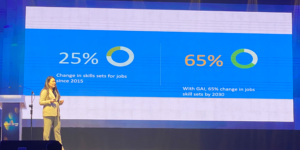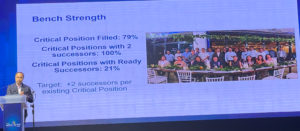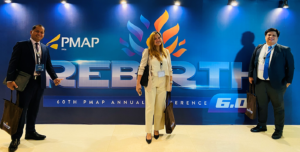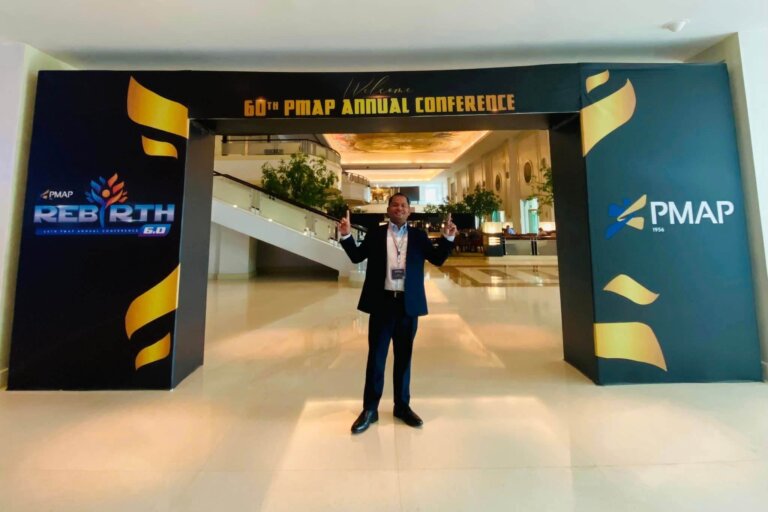The recently concluded 60th PMAP Annual Conference at the Waterfront Cebu City Hotel & Casino proved to be a pivotal gathering, leaving an indelible mark on HR professionals, business leaders, and industry experts alike. Day 2 of the conference unfolded as a panorama of insights and innovative strategies, providing a sneak peek into the future landscape of talent management.
The day commenced with a captivating Keynote Session led by Kristine Maglaque, Enterprise Account Director at LinkedIn, shedding light on recalibrating talent strategies using insights from the Global Talent Trends Report. Maglaque delved into crucial trends such as declining hiring in various industries, evolving labor markets, and the growing interest in AI-related job opportunities. Her emphasis on companies supporting employee skill-building resonated strongly, drawing a clear connection to heightened internal mobility.
PMAP Conference Highlight: HR Metrics and People Analytics

A highlight of the conference was the Plenary Roundtable Discussion 1, where Ms. Loida Sagaran (VP – HR, Infor S.E.A. PTE Ltd.), Mr. Arlo Sarmiento (CEO, Vivant Corporation), and Mr. Jason Radisson (CEO, Movo) engaged in a riveting discourse on the dynamic and competitive landscape of modern organizations. Their conversation revolved around the pivotal role of HR Metrics and People Analytics in talent acquisition, innovation, and overall organizational success.
Arlo Sarmiento shared insights into the company’s phenomenal growth, underscoring the need for scalable HR strategies. Embracing flexible work arrangements, cross-posting employees for skill development, and prompt reactions to changes in compensation were highlighted as essential practices. Ensuring at least two potential successors for critical roles was emphasized for business continuity.

Meanwhile, Loida Sagaran stressed the effective communication of HR metrics to benefit employees and the importance of aligning HR proposals with the CEO’s vision for long-term business success. Prioritizing diversity and inclusion initiatives and recognizing the value of digital tools in HR operations were also emphasized.
Finally, Jason Radisson introduced a 5-stage people analytics maturity model, emphasizing the role of HR metrics and analytics in driving success.
The key takeaways from the discussion highlighted how people analytics reshapes HR, the crucial balance between technology and the human touch, and the potential for PMAP to lead in promoting a culture of continuous learning through harnessing people analytics, making organizations more agile.
Talent Management: Trends and Strategies
As the afternoon sun painted vibrant hues over the second day of the conference, concurrent sessions promised to unveil the latest trends and strategies in talent management.
One such session, CS 6: Predictive People Analytics with GenAI, featured Mike Godinez (CPO, VP for Human Capital – RAFI) and Tanmaya Jain (Founder & CEO – Infeedo Tech). The fireside chat explored the intersection of people analytics and GenAI in HR. It emphasized GenAI’s potential to revolutionize talent management, boost employee engagement, and enhance workforce planning. The discussion delved into the importance of culture fit at the Ramon Aboitiz Foundation, Inc. (RAFI) and the utilization of “Amber AI” to enhance employee happiness and monitor HR metrics.
In ST 2: Future-Proof Your Workforce, Marie Antonio (Talent Solutions Lead – AON Philippines) led a discussion on future-proofing the workforce, focusing on skills taxonomies and talent mobility. The session provided insights into the importance of skills taxonomies, the need for an established job architecture, and strategies to address employee retention challenges.
Also worth noting is CS 18: Innovative Recruitment Future-ready Talent Acquisition Ecosystem presented by Dominic Ligot (Founder & CEO – CirroLytix). It explored innovative recruitment strategies in a post-pandemic world. The session highlighted the use of AI, mandatory reskilling programs, and recommended Gen AI tools to enhance recruitment efficiency.
Lastly, CS 23: Strategies to Empower the Future of Manufacturing led by Dan Lachica (Chief of Party – AMDev Program), delved into efforts to bridge the gap between education and the needs of the manufacturing sector. The session emphasized the necessity for a strong foundation in basic competencies, challenges in adopting advanced methods, and the importance of partnerships with academic institutions.
In conclusion, Day 2 of the PMAP Annual Conference provided a comprehensive exploration of talent management. It covered topics ranging from recalibrating strategies to leveraging advanced technologies and fostering collaborative partnerships between HR and CEOs. The shared insights equip HR professionals with the tools needed to navigate the evolving landscape of workforce dynamics and stay ahead in the competitive business environment. The revelations from the afternoon sessions further enriched the conference, offering a holistic view of tomorrow’s workforce and the strategies essential for success in the dynamic world of HR.

John Clements Consultants, Inc. provides innovative human resources services. Explore our Client Solutions page today.





